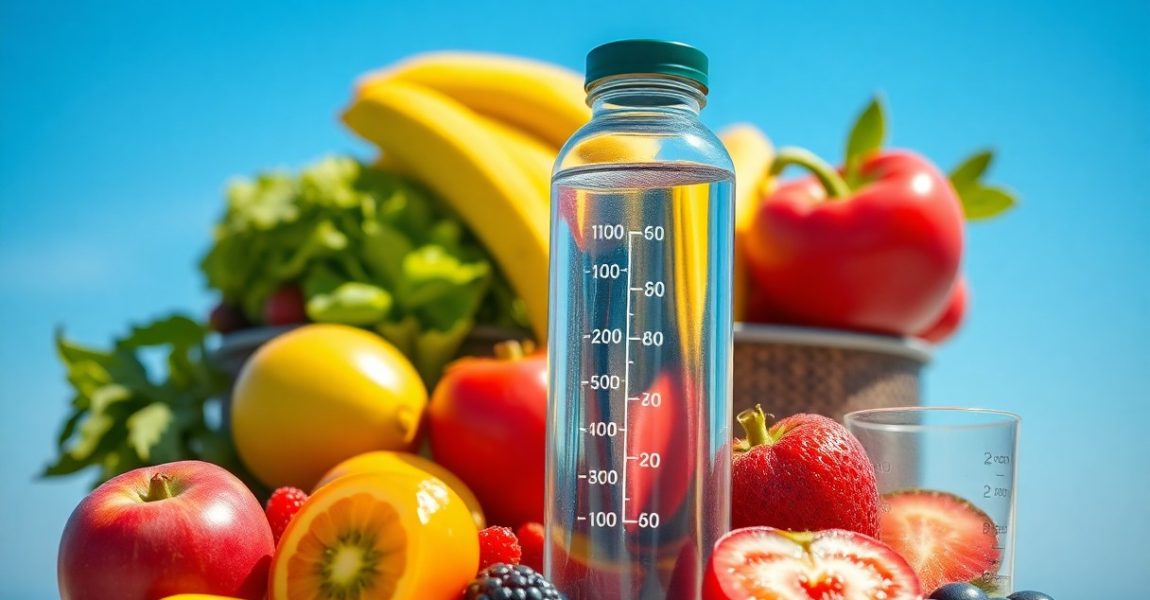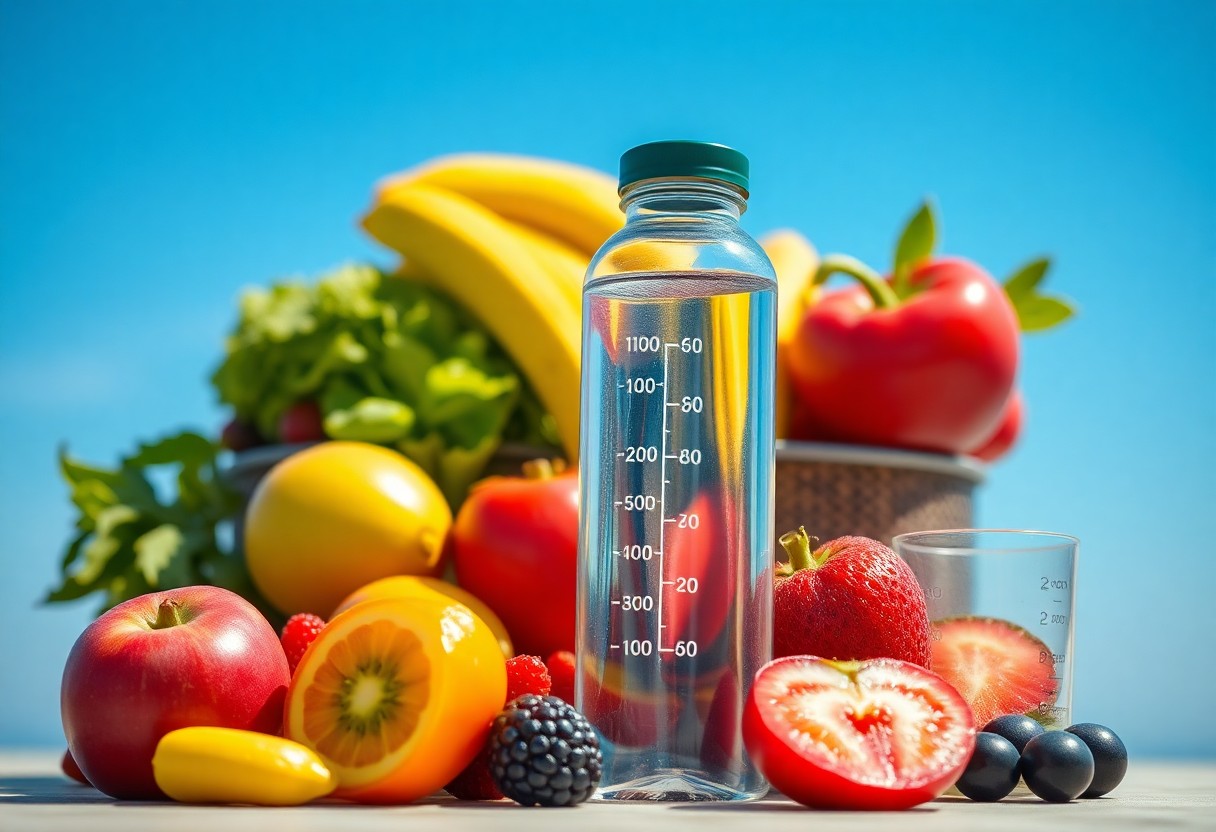
Over the course of your day, you may not realize that proper hydration plays a significant role in maintaining your energy levels. Whether you feel fatigued or alert directly correlates with how much water you consume. Dehydration can lead to serious decreases in physical and mental performance, leaving you feeling sluggish and unfocused. By understanding this vital connection, you can take simple steps to enhance your well-being and keep your energy levels high throughout the day. Energize your day with alkaline water, the natural way to stay hydrated and power up your body
Contents
- 1 The Physiology of Hydration and Energy
- 2 The Dehydration Paradox: Energy Drain and Cognitive Fog
- 3 The Energy-Boosting Effects of Optimal Hydration
- 4 Practical Strategies to Stay Hydrated for Energy
- 5 The Broader Implications: Hydration, Health, and Productivity
- 6 To wrap up
- 7 FAQ
- 7.0.1 Q: How does water consumption affect energy levels in the body?
- 7.0.2 Q: What are the signs of dehydration that can impact energy levels?
- 7.0.3 Q: How much water should I drink to maintain optimal energy levels?
- 7.0.4 Q: Can certain foods help in maintaining hydration and energy levels?
- 7.0.5 Q: Are there any specific times when drinking water can boost energy levels?
Key Takeaways:
- Hydration directly impacts energy metabolism, as water aids in the breakdown of nutrients for energy production.
- Dehydration can lead to fatigue and decreased concentration, affecting overall energy levels throughout the day.
- Even mild dehydration can hinder physical performance and endurance, making hydration imperative for active lifestyles.
- Water plays a role in temperature regulation, which is vital for maintaining optimal energy expenditure during physical activities.
- Incorporating hydration reminders throughout the day can help maintain energy levels and improve cognitive function.

The Physiology of Hydration and Energy
Water’s Role in Cellular Metabolism
Every cell in your body relies on water to perform its metabolic functions effectively. Water is vital in the biochemical processes that convert carbohydrates, proteins, and fats into usable energy. This transformation occurs in the mitochondria of cells, often referred to as the powerhouse of the cell. When you consume food, it’s the presence of water that aids in hydrolysis, a process in which water molecules help break bonds in food compounds, leading to the release of energy. In dehydrated states, the efficiency of this energy extraction diminishes, leading to sluggishness and fatigue.
Moreover, water aids in the transportation of nutrients to cells and the removal of waste products, further contributing to energy levels. For instance, impaired hydration can lead to an accumulation of lactic acid during physical exertion. This buildup not only robs you of energy but can also result in muscle cramps and soreness. Therefore, maintaining optimal hydration ensures that your cellular metabolism operates at peak performance, directly impacting your energy levels throughout the day. Fuel your body’s energy with our 5-gallon alkaline water—pure, refreshing hydration to keep you performing at your best.
Hydration’s Impact on Physical and Mental Performance
The relationship between hydration and performance is well documented, showing that insufficient water intake can significantly impair both physical capabilities and cognitive function. For instance, studies indicate that even a 2% drop in body water can lead to noticeable declines in strength, power, and endurance. Whether you are lifting weights or running a marathon, being well-hydrated directly correlates with your body’s ability to perform at its best. On top of that, hydration plays a role in regulating body temperature, which is vital during any physical activity.
In terms of mental performance, dehydration can have a dramatic effect on mood, attention, and memory. Research indicates that just mild dehydration (about 1-3% of body weight) can degrade cognitive performance, leading to feelings of fatigue and difficulty concentrating. This can mirror the symptoms of lethargy, making it challenging to stay focused and productive. In high-stakes environments like schools, workplaces, or competitive sports, adequate hydration can be the difference between success and mediocrity.
Studies also reveal that remaining hydrated can enhance cognitive functions, such as reaction time and short-term memory. For instance, a study published in the Journal of Nutrition found that participants who were moderately dehydrated performed worse on tasks requiring vigilance and concentration compared to their well-hydrated counterparts. As hydration levels improve, so does your ability to think clearly and react efficiently, reinforcing the idea that adequate water intake is not just a physical necessity but a mental one as well.
The Dehydration Paradox: Energy Drain and Cognitive Fog
Recognizing the Signs of Dehydration
Pay close attention to your body’s signals; thirst is only the tip of the iceberg when it comes to understanding hydration levels. Many individuals confuse symptoms of dehydration with typical fatigue, making it difficult to pinpoint the actual cause of energy drain. You might experience a persistent feeling of tiredness, irritability, or even dizziness, which can significantly impact daily tasks and your overall mood. Additionally, dry mouth, dark yellow urine, and headaches are often overlooked indicators that your body is crying out for more water.
Some people find that simple changes in their body temperature regulation—like increased sweating or a feeling of heat exhaustion—are also signs of dehydration. You may feel less motivated to engage in physical activities, leading to a pretty significant drop in your energy levels. Identifying these early warning signs can help you take action, but it often requires an awareness and mindfulness that many overlook in their daily routines.
Analysis of Studies Linking Hydration and Fatigue
Scientific studies consistently demonstrate a clear correlation between hydration and levels of fatigue. For instance, research published in the Journal of Nutrition reveals that mild dehydration, often defined as losing about 1-2% of body weight in water, can lead to noticeable declines in energy and performance, especially during mentally or physically taxing activities. Participants in these studies reported higher levels of fatigue and cognitive fog when their hydration levels dropped, showcasing that a simple lack of water can have profound effects on how well you think and perform.
A comprehensive review in the Journal of Clinical Medicine points out that hydration status directly impacts cognitive function. In studies where participants were asked to maintain various hydration levels, those who stayed properly hydrated displayed enhanced focus, memory retention, and cleaner mental clarity, while dehydrated counterparts struggled with simple tasks. This not only emphasizes hydration’s role in physical performance but also its vital importance in mental acuity.
Digging deeper into the context, a juxtaposition of clinical settings reveals that athletes and busy professionals are especially vulnerable to the pitfalls of dehydration. For example, athletes often lose significant amounts of water through sweat yet may not perceive their thirst actively, leading to an energy drain that affects their performance levels. Conversely, office workers may negate hydration needs amid computerized work environments, resulting in detrimental cognitive fog that affects overall productivity. Understanding these nuances can help you adopt better hydration practices and ultimately boost your energy levels throughout the day.
The Energy-Boosting Effects of Optimal Hydration
How Proper Hydration Enhances Energy Production
Staying well-hydrated significantly influences your body’s energy levels. Water is involved in numerous metabolic processes, including the breakdown of carbohydrates and fats for energy. An optimal hydration level keeps your blood volume sufficient, ensuring that oxygen and nutrients can be efficiently transported to your cells, where energy production occurs. When you’re dehydrated, even by 2-3%, your body struggles to maintain optimal performance, leading to noticeable fatigue and reduced motivation. You might find that simple tasks become more exhausting than usual, and mental clarity takes a hit.
Your energy levels are directly linked to how effectively your body can produce ATP (adenosine triphosphate), the molecule that powers nearly all cellular functions. Dehydration diminishes your organs’ ability to convert nutrients into energy, thus making you feel drained. Maintaining your hydration levels will help keep this process running smoothly, meaning you can tackle your day-to-day activities with greater vitality and focus.
The Synergy Between Water Intake and Nutrient Absorption
The presence of adequate water is vital for maximizing nutrient absorption, which further supports your energy levels. Water acts as a medium for digestion, facilitating the breakdown of food in your stomach and intestines. Essential nutrients, such as vitamins, minerals, and amino acids, require water to be effectively absorbed into your bloodstream. Without sufficient hydration, your body struggles to extract and utilize these energy-boosting nutrients, leaving you feeling sluggish and fatigued.
As vital as whole foods are, their potential energy-boosting benefits can only be realized if you consume adequate water. Studies have shown that individuals who maintain high hydration levels experience better absorption rates of key nutrients, promoting more consistent energy levels throughout the day. Placing emphasis on water intake, especially alongside meals, actively enhances your body’s ability to capitalize on the nutrients you consume, resulting in improved stamina and overall wellness.
A lack of water not only diminishes nutrient absorption but can create an imbalance that impairs the effects of healthy foods you eat. For example, if you’re consuming an iron-rich meal but are dehydrated, your body may struggle to absorb the iron effectively, leading to tiredness or fatigue. Aim to drink water consistently, especially in conjunction with meals, so you can harness the benefits of your food for optimal energy production. Balancing both aspects will ensure you’re firing on all cylinders, ready to take on whatever challenges the day throws your way.
Practical Strategies to Stay Hydrated for Energy
Daily Water Intake Recommendations and Myths
Your hydration needs can vary significantly based on several factors, including activity level, climate, and overall health. A common guideline is to aim for eight 8-ounce glasses of water daily, often referred to as the “8×8 rule.” However, this isn’t a one-size-fits-all recommendation. The Institute of Medicine suggests that men should aim for about 3.7 liters (or roughly 13 cups) of total fluid intake a day, while women should target about 2.7 liters (or around 9 cups) to maintain optimal hydration. Consider that other beverages and even foods with high water content, like fruits and vegetables, contribute to your daily intake.
Dispelling myths surrounding hydration can help you better assess your needs. For instance, many believe that thirst should be your only guide for hydration. In reality, you may already be dehydrated by the time you feel thirsty. Additionally, the idea that you can drink too much water is valid but applies mainly to extreme cases. Most individuals will benefit from maintaining adequate fluid intake throughout the day instead of waiting until they feel thirsty.
Creative Approaches to Increase Water Consumption
Certain strategies can creatively boost your water intake without making it feel like a chore. Adding flavor to your water is an effective way to encourage yourself to drink more; infusing water with slices of fruits like lemon, cucumber, or berries can make it not only appetizing but visually appealing as well. Investing in a reusable water bottle with ounces marked on the side can serve as a visual cue to keep sipping throughout the day. Keeping it within reach during work or leisure activities fosters a habit that leads to increased consumption.
Experimenting with herbal teas or sparkling water can also add variety to your hydration routine. Setting specific times during the day to refill your water bottle can create a structured approach to hydration that complements your schedule. Take it a step further by incorporating hydration into your meal prep; making a habit of drinking a glass of water before each meal serves a dual purpose of quenching thirst and aiding digestion.
The Broader Implications: Hydration, Health, and Productivity
Correlation Between Hydration and Workplace Efficiency
Studies indicate that inadequate hydration can lead to significant declines in workplace productivity. As your body becomes less hydrated, your cognitive abilities can become impaired, impacting tasks requiring focus or critical thinking. A dehydrated individual may experience issues like decreased attention span, longer reaction times, and increased fatigue. For example, a study conducted by the University of Connecticut revealed that just a 1% drop in hydration levels can negatively affect your performance, paralleling the effects of losing two nights of sleep. Therefore, by ensuring your body remains adequately hydrated, you position yourself to operate at your fullest potential.
Moreover, efficient hydration can serve as a natural boost to your motivation. A consistent water intake can elevate mood and stave off feelings of lethargy, fostering a more energetic work environment. This means that simple changes like keeping a water bottle at your desk or setting reminders to drink can dramatically enhance both your well-being and work output. Taking hydration seriously could mean the difference between exceptional performance and merely getting by.
Long-term Effects of Hydration on Overall Well-being
Over the long term, proper hydration has a profound impact on various aspects of your health. Chronic dehydration can lead to serious complications, including kidney stones and urinary tract infections. Additionally, it plays a crucial role in maintaining optimal skin health. Studies have shown that even mild dehydration can result in symptoms such as dryness and reduced elasticity, leading to premature aging. Consequently, your appearance can reflect your hydration habits, which can affect both self-esteem and social interactions.
Furthermore, maintaining hydration supports cardiovascular health by helping your heart pump blood more efficiently. This means less strain on your heart and a reduced risk of conditions such as hypertension. The cumulative effects of sustained hydration promote not just physical health but emotional and mental clarity as well. Staying engaged and productive in your daily life largely hinges on your commitment to drink enough water. Your body’s intricate systems function collaboratively, and hydration ensures that every part works in harmony toward a healthier, more vibrant you.
To wrap up
With this in mind, understanding the connection between water intake and your body’s energy levels is vital for optimizing your overall well-being. When you stay well-hydrated, you facilitate the various physiological processes that allow your body to function efficiently. This means that everything from digestion to muscle performance can improve, resulting in heightened energy levels and improved mental clarity. By prioritizing hydration, you equip yourself with the energy needed to tackle daily challenges and maintain an active lifestyle.
Moreover, integrating adequate water consumption into your daily routine does not need to be complicated. Simple practices, such as carrying a reusable water bottle and setting reminders to drink throughout the day, can significantly impact your hydration levels. By being proactive about your water intake, you enhance your energy, mood, and overall health. So, pay attention to your body’s signals, stay hydrated, and unlock the benefits that come with optimal energy levels.
FAQ
Q: How does water consumption affect energy levels in the body?
A: Water plays a significant role in various bodily functions, including nutrient transport and temperature regulation. When the body is properly hydrated, it can efficiently deliver oxygen and nutrients to cells, resulting in improved energy levels. Conversely, dehydration can lead to fatigue, decreased concentration, and reduced physical performance.
Q: What are the signs of dehydration that can impact energy levels?
A: Common signs of dehydration include dry mouth, fatigue, dizziness, headache, and decreased urine output. These symptoms can signal that the body is not receiving enough fluids, which can directly impact one’s energy levels, leading to sluggishness and reduced stamina during daily activities.
Q: How much water should I drink to maintain optimal energy levels?
A: While individual water needs can vary based on factors like age, weight, and activity levels, a general guideline is to aim for about 8-10 cups (64-80 ounces) of water daily. Those engaged in strenuous exercise or living in hot climates may require more hydration to sustain energy levels and overall health.
Q: Can certain foods help in maintaining hydration and energy levels?
A: Yes, many fruits and vegetables have high water content and can contribute to overall hydration. Foods like cucumbers, watermelon, oranges, and strawberries not only hydrate but also provide important vitamins and minerals that support energy metabolism, promoting better energy levels throughout the day.
Q: Are there any specific times when drinking water can boost energy levels?
A: Timing can impact hydration and energy levels. Drinking water first thing in the morning can help kickstart the metabolism and rehydrate the body after sleep. Additionally, sipping water during and after physical activities can help maintain hydration and prevent fatigue, thus sustaining energy levels for longer periods.
- August 15, 2025
- Benefits
